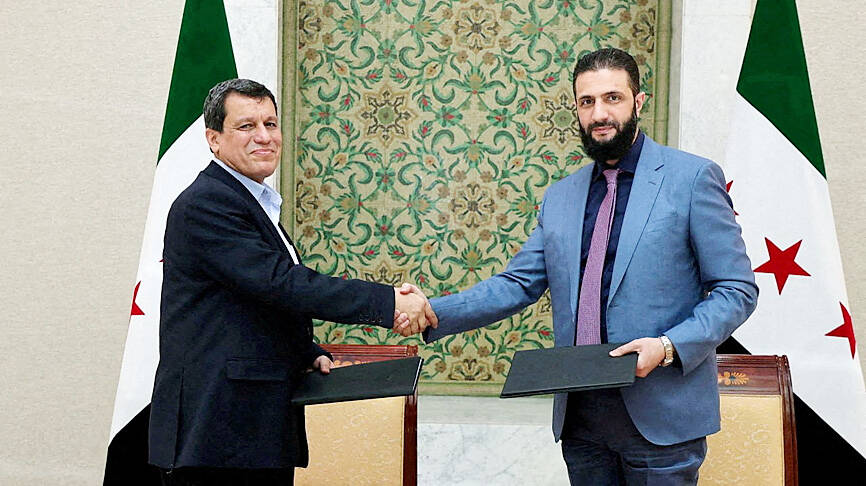The Syrian presidency on Monday announced an agreement with the head of the Kurdish-dominated Syrian Democratic Forces (SDF) to integrate the institutions of the autonomous Kurdish administration in the northeast into the national government.
The new authorities under Interim Syrian President Ahmed al-Sharaa have sought to disband armed groups and establish government control over the entirety of the nation since ousting long-time president Bashar al-Assad in December last year after more than 13 years of civil war.
The new accord, which is expected to be implemented by the end of the year, comes after days of violence in the heartland of Syria’s Alawite minority that has posed the most serious threat yet to the nation’s stability since al-Assad’s fall.

Photo: SANA via Reuters
The presidency on Monday published a statement signed by both parties laying out the agreement on “the integration of all the civilian and military institutions of the northeast of Syria within the administration of the Syrian state, including border posts, the airport, and the oil and gas fields.”
Media released a photograph of al-Sharaa shaking hands with SDF leader Mazloum Abdi following the signing of the agreement.
The statement said “the Kurdish community is an essential component of the Syrian state,” which “guarantees its right to citizenship and all of its constitutional rights.”
It also rejected “calls for division, hate speech and attempts to sow discord” between different segments of Syrian society.
Abdi yesterday said that the accord was a “real opportunity to build a new Syria.”
“We are committed to building a better future that guarantees the rights of all Syrians and fulfills their aspirations for peace and dignity,” the SDF leader wrote on social media.
The SDF serves as the de facto army of the autonomous Kurdish administration that controls large swathes of northern and eastern Syria, including most of the nation’s oil and gas fields, which might prove a crucial resource for the new authorities as they seek to rebuild the nation.
The authorities on Monday announced the end of an operation against loyalists of al-Assad that the Syrian Observatory for Human Rights said had killed at least 1,068 civilians, most of them members of the Alawite minority who were executed by the security forces or allied groups.
The violence in the coastal heartland of the Alawite community, to which al-Assad belongs, broke out last week after gunmen loyal to the deposed president attacked Syria’s new security forces.
The fighting has also killed 231 security personnel and 250 pro-al-Assad fighters, the Britain-based observatory said.
Marginalized and repressed during decades of al-Assad family rule, the Kurds were deprived of the right to speak their language and celebrate their holidays and, in many cases, of Syrian nationality.
The SDF took advantage of the withdrawal of government forces during the civil war which broke out in 2011 to establish de facto autonomy in the north and northeast.
The SDF played a key role in the fight against the Islamic State group, which was defeated in its last territorial stronghold in 2019.
Since al-Assad’s overthrow, the Kurds have shown a degree of willingness to engage with the new authorities, but they were excluded from a national dialogue conference over their refusal to disarm.
The agreement comes nearly two weeks after a historic call by jailed Kurdistan Workers’ Party (PKK) founder Abdullah Ocalan for the militant group to lay down its weapons and disband.
The SDF maintains it is independent from the PKK, which has waged a decades-long insurgency against the Turkish government.
The Turkish government has designated the PKK a terrorist organization, as have the US and the EU.

THE TRAGEDY OF PUNCH: Footage of the seven-month-old Japanese macaque has gone viral online after he was rejected by his mother and formed a bond with a soft toy A baby monkey in Japan has captured hearts around the world after videos of him being bullied by other monkeys and rejected by his mother went viral last week. Punch, a Japanese macaque, was born in July last year at Ichikawa City Zoo. He has drawn international attention after zookeepers gave him a stuffed orangutan toy after he was abandoned by his mother. Without maternal guidance to help him integrate, Punch has turned to the toy for comfort. He has been filmed multiple times being dragged and chased by older Japanese macaques inside the enclosure. Early clips showed him wandering alone with

South Korea would soon no longer be one of the few countries where Google Maps does not work properly, after its security-conscious government reversed a two-decade stance to approve the export of high-precision map data to overseas servers. The approval was made “on the condition that strict security requirements are met,” the South Korean Ministry of Land, Infrastructure and Transport said. Those conditions include blurring military and other sensitive security-related facilities, as well as restricting longitude and latitude coordinates for South Korean territory on products such as Google Maps and Google Earth, it said. The decision is expected to hurt Naver and Kakao

Australian Prime Minister Anthony Albanese yesterday said he did not take his security for granted, after he was evacuated from his residence for several hours following a bomb threat sent to a Chinese dance group. Albanese was evacuated from his Canberra residence late on Tuesday following the threat, and returned a few hours later after nothing suspicious was found. The bomb scare was among several e-mails threatening Albanese sent to a representative of Shen Yun, a classical Chinese dance troupe banned in China that is due to perform in Australia this month, a spokesperson for the group said in a statement. The e-mail

‘OCCUPATION’: Hong Kong said it had lodged ‘stern protests’ with Panama’s consulate, and would ‘staunchly support’ the rights and interests of Hong Kong companies Panamanian President Jose Raul Mulino on Monday ordered the temporary occupation of two ports run by a unit of CK Hutchison Holdings Ltd following the Supreme Court’s ruling against the firm’s concession, escalating a dispute that has become a proxy battle between the US and China in Latin America. Mulino said in a speech that the administration and operation of the two ports on the strategic Panama Canal is to revert to the country’s National Maritime Authority to ensure their uninterrupted, safe and efficient operation. The occupation covers movable equipment at the ports and does not mean a definitive loss of